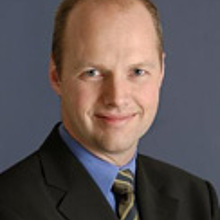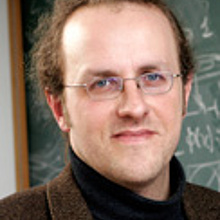Jump to the content
- {{#headlines}}
- {{title}} {{/headlines}}

Contact
Kristina Güroff
Kerstin Schweichhart
Press, Communications
and Marketing
Tel.: +49 228 833-144/257
Fax: +49 228 833-441
presse[at]avh.de
Georg Scholl
Head of
Press, Communications and Marketing
Tel.: +49 228 833-258
Fax: +49 228 833-441
presse[at]avh.de
Sebastian Thrun and Bernhard Schölkopf
Intelligent Systems

Professor Dr. Sebastian Thrun
teaches and conducts research at Stanford University. Since 2004 he has headed the Stanford Institute for Artificial Intelligence, one of the world’s largest and most important institutes in this field. The 43-year-old information scientist works at the interface between artificial intelligence and robotics. His main interest is robotic systems which are able to learn and move independently. One of his achievements has been to show that it is possible to use a mobile robot to create a map of the surroundings without the availability of prior knowledge and to estimate the robot’s position and orientation in the process effectively. His work also opens up new fields of application for robots beyond industrial mass production. In 1997 he developed the “Rhino” robot, which was able to provide a guided tour through the Deutsches Museum Bonn autonomously. The successor, “Minerva”, was tested in 1998 at the Smithsonian Museum in Washington. Other robot models can chart mines or use speech to communicate with humans. Sebastian Thrun has therefore achieved findings of extreme scientific importance concerning the ability of mobile systems to orientate themselves.

Professor Dr. Bernhard Schölkopf
is a Director at the Max Planck Institute for Metals Research in Stuttgart. The 43-year-old mathematician and physicist is also one of the founding Directors of the newly-established Max Planck Institute for Intelligent Systems in Stuttgart and Tübingen. He is one of Europe’s leading researchers in the field of machine learning. He researches computational methods, so-called algorithms, which can be used to program computers to react flexibly to new situations.
Bernhard Schölkopf’s research results have made the algorithms for machine learning more efficient. Statistical estimation problems can thus be generalized to such a degree that they can be used on biological-medical issues, as well as problems relevant to the social sciences and philosophy.
Further Information
- Max Planck Research Award Winners 2016
- Max Planck Research Award Winners 2015
- Max Planck Research Award Winners 2014
- Max Planck Research Award Winners 2013
- Max Planck Research Award Winners 2012
- Max Planck Research Award Winners 2011
- Max Planck Research Award Winners 2010
- Max Planck Research Award Winners 2009
- Max Planck Research Award Winners 2008
- Max Planck Research Award Winners 2007
- Max Planck Research Award Winners 2006
- Max Planck Research Award Winners 2005
- Max Planck Research Award Winners 2004
